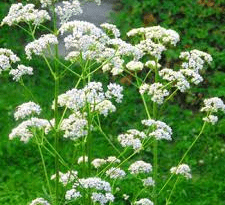Spices: A Step-by-Step Guide
Spices are special things or ingredients we use to make our food taste better. They come from plants, like leaves, seeds, and roots. Spices have been around for a very long time, even longer than your grandparents! People used spices in ancient times to make their food yummy.
There are many types of spices, each with its own taste and smell. Some spices are spicy, like red pepper, while others are sweet, like cinnamon. Spices can be strong, so we use just a little bit to add flavor to our dishes. You don’t need a lot of spices to make your food taste good.
Think about your favorite foods, like pizza, burgers, or pasta. Spices are the secret ingredients that make them super delicious. They make your taste buds happy and dance with joy. Imagine eating plain pasta – it might be boring. But when you add spices like oregano or basil, the pasta becomes a party in your mouth!
People from different parts of the world use spices in their traditional dishes. For example, in India, they love using spices like turmeric, cumin, and coriander to create amazing flavors in their curries. Mexican food uses spices like chili powder and cumin to make tacos and salsa exciting. Spices bring cultures together through the love of tasty food.
Spices are not just tasty; they also have some special powers. Some spices, like ginger, can help when you have a tummy ache. Others, like garlic, might help keep you healthy. People used to believe that spices had magic in them, and while that’s not really true, they do have some cool benefits.
Imagine a world without spices. Bland and very boring, right? Spices make our meals interesting and fun. They add colors, smells, and flavors that make us want to eat. So the next time you enjoy a yummy meal, remember to thank the spices for making it so awesome.
Read Also: Vanilla Flower (Vanilla planifolia): All You Need To Know About
Benefits of using Spices
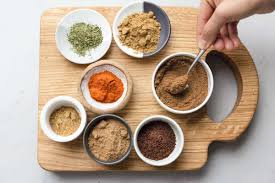
let’s look at some of the benefits of using spices in our food:
1. Flavor Enhancement: Spices are like the superheroes of taste. They transform plain foods into exciting culinary experiences. Just a pinch of the right spice can turn a dull dish into something amazing.
2. Health Boosters: Many spices have health benefits. For example, turmeric contains curcumin, which might help reduce inflammation. Garlic is believed to have antibacterial properties. So, adding spices to your food not only makes it tasty but might also be good for your body.
3. Digestive Aid: Some spices, like ginger and peppermint, can help soothe an upset stomach. They’ve been used for generations to calm tummy troubles.
4. Metabolism Kick: Spicy spices like chili peppers contain compounds that can boost your metabolism. This means they can help your body burn calories faster.
5. Antioxidant Power: Some spices are loaded with antioxidants, which are like shields that protect our cells from damage. Cinnamon, for instance, is rich in antioxidants.
6. Blood Sugar Control: Certain spices, like cinnamon and fenugreek, might help regulate blood sugar levels. This can be especially helpful for people with diabetes.
7. Heart Health: Spices like cayenne pepper and cinnamon could have a positive effect on heart health by helping to lower blood pressure and cholesterol levels.
8. Cultural Connection: Spices are an essential part of many cuisines around the world. They connect us to different cultures and traditions, allowing us to experience the flavors of far-off places.
9. Natural Preservatives: In the past, spices were used not only for flavor but also for preserving food. Some spices have natural properties that can help slow down the growth of bacteria and other harmful microorganisms.
10. Mood Enhancers: Believe it or not, some spices might even help improve your mood. The aroma of certain spices, like saffron, is believed to have a positive impact on emotions.
11. Weight Management: Since spices can add lots of flavor without adding many calories, they can be a great tool for managing your weight. They make healthier foods more appealing.
12. Cooking Creativity: Experimenting with spices can open up a whole new world of cooking. Mixing and matching spices allows you to create unique and delicious flavors.
Remember, while spices can have wonderful benefits, it’s important not to overdo it. A little goes a long way. So, next time you’re in the kitchen, don’t hesitate to reach for those spice jars to make your meals not only tastier but also healthier.
How to Choose the Right Spices for your Needs
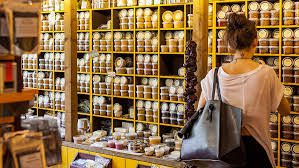
Choosing the right spice for your needs can be like picking the perfect puzzle piece to complete your dish. Here’s how you can do it:
1. Understand Your Dish: Consider what you’re cooking. Is it a soup, a curry, pasta, or a dessert? Different dishes call for different spices. For example, Italian dishes often use basil and oregano, while Indian curries might need cumin and coriander.
2. Flavor Profile: Think about the flavor you want to achieve. Do you want your dish to be spicy, sweet, tangy, or savory? Each spice brings its own unique taste. Red pepper adds heat, cinnamon adds sweetness, and cumin adds earthiness.
3. Start Simple: If you’re new to using spices, start with a few basic ones. Salt and black pepper are universal options that work well with many dishes. As you get comfortable, you can gradually explore more complex flavors.
4. Experiment Gradually: Don’t go overboard with new spices all at once. Add one new spice to your dish and taste as you go. This way, you can see how it affects the flavor and adjust accordingly.
5. Check Combinations: Some spices work well together, while others might clash. Look up common spice blends used in specific cuisines to get an idea of what goes together. For instance, herbs like rosemary and thyme often work together in Mediterranean dishes.
6. Consider Aroma: Smell the spice before using it. The aroma can give you a good idea of its intensity and the kind of flavor it will add to your dish.
7. Freshness Matters: If possible, use freshly ground spices. They have stronger flavors than pre-ground ones. Invest in a spice grinder if you can, and grind your spices as needed.
8. Read Labels: Check the labels for any allergens or additives that you might want to avoid. Also, see if the spice has a best-before date to ensure you’re using fresh ones.
9. Ask for Advice: Don’t hesitate to ask friends, family, or even online cooking communities for advice. They might have some great suggestions based on their experiences.
10. Balance and Moderation: Remember, a little goes a long way with spices. Start with a small amount and add more if needed. You can always add more later, but it’s hard to fix an overly spiced dish.
11. Personal Preferences: Taste is subjective, so don’t be afraid to adjust spices according to your personal preference. Some people love more heat, while others prefer milder flavors.
12. Keep Notes: If you experiment with different spices, keep a cooking journal. Note down what you used and how it turned out. This can be helpful for future reference.
Choosing the right spice can be a fun and creative part of cooking. With a little practice, you’ll become more confident in matching spices to your dishes and creating flavors that satisfy your taste buds.
Reasons Why Spices are Important
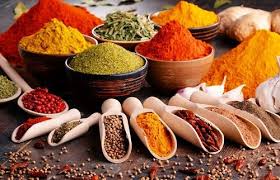
Spices are important for so many variety of reasons:
1. Flavor Enhancement: Spices add depth, complexity, and excitement to food. They elevate dishes from bland to delicious by providing unique tastes and aromas.
2. Cultural Significance: Spices are often integral to the identity of a culture’s cuisine. They contribute to the distinct flavors and traditions of different regions around the world.
3. Health Benefits: Many spices have been linked to health benefits. Some contain antioxidants, vitamins, and minerals that can support overall well-being.
4. Digestive Aid: Certain spices can aid digestion and soothe stomach discomfort. They have been used for centuries in traditional medicine for their digestive properties.
5. Preservation: Historically, spices were used as natural preservatives. Their antimicrobial properties helped extend the shelf life of food before the advent of modern refrigeration.
6. Aromatherapy: The aroma of spices can have positive effects on mood and emotions. Just the scent of certain spices can evoke feelings of comfort and happiness.
7. Global Connection: The use of spices connects cultures and communities worldwide. They tell stories of trade, exploration, and exchange between different parts of the world.
8. Culinary Creativity: Spices allow chefs and home cooks to experiment and create unique flavor profiles. Mixing and matching spices can lead to exciting and innovative dishes.
9. Sensory Experience: Spices engage multiple senses – taste, smell, and even sight. They make eating a more sensory-rich and enjoyable experience.
10. Economic Value: The spice trade has historically played a significant role in global economies. Some spices were once considered more valuable than gold!
11. Reduced Need for Salt and Fat: By using spices, you can enhance flavor without relying on excessive salt or unhealthy fats. This is particularly important for maintaining a balanced diet.
12. Tradition and Rituals: Spices are often used in traditional rituals and ceremonies. They can symbolize special occasions and hold cultural significance.
In addition, spices are important because they are not just about taste – they touch on cultural, historical, health-related, and sensory aspects of our lives. They enrich our food, our health, and our connection to the world around us.
People Who Uses Spices
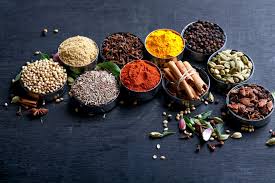
People all around the world use spices in their cooking. Spices are a universal language of flavor that transcends borders and cultures. Here are some examples of who uses spices:
1. Home Cooks: Everyday people like you and me use spices in our kitchens to make our meals tastier and more exciting. Whether it’s adding a dash of black pepper to scrambled eggs or using a mix of spices for a special marinade, home cooks use spices to enhance their dishes.
2. Professional Chefs: Chefs in restaurants and culinary establishments use spices to create gourmet dishes that tantalize the taste buds of their customers. They skillfully combine spices to bring out the best in their creations.
3. Cultural and Ethnic Communities: Different cultures and ethnic groups have their own unique spice blends that are central to their cuisines. For example, Indian cuisine relies heavily on spices like cumin, turmeric, and cardamom, while Middle Eastern cuisine often uses spices like cumin and sumac.
4. Traditional Healers: In some cultures, spices have been used for their medicinal properties. Traditional healers and herbalists might use spices to create remedies for various ailments.
5. Food Manufacturers: The food industry uses spices to flavor a wide range of products, from snacks to sauces to ready-to-eat meals. Spices play a key role in creating consistent and delicious flavors in packaged foods.
6. Bakers and Pastry Chefs: Spices aren’t limited to savory dishes. Bakers and pastry chefs use spices like cinnamon, nutmeg, and ginger to add warmth and depth to baked goods and desserts.
7. Beverage Makers: Spices aren’t just for food. They’re used in beverages too! Think about chai tea with its blend of aromatic spices, or mulled wine with cinnamon and cloves.
8. Food Enthusiasts and Explorers: People who love to explore different cuisines and flavors also use spices. They might experiment with new spices and spice blends to recreate international dishes at home.
9. Street Food Vendors: Street food vendors in various countries use spices to create mouthwatering street snacks that are full of flavor and often unique to their region.
10. Historians and Anthropologists: Even historians and anthropologists study the use of spices to understand cultural exchanges, trade routes, and historical cooking practices.
In essence, spices are a part of the culinary landscape across the globe. They’re used by people from all walks of life to create delicious and memorable meals, celebrate cultural traditions, and explore the exciting world of flavor.
Read Also: Significance And Uses of Craspedia Flower
Where to Find Spices for Sale near Me/You
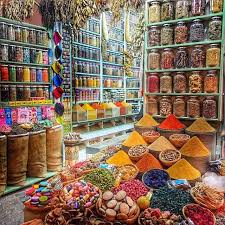
Here are five perfect places where you can find or locate spices for sale:
1. Local Grocery Stores: Your neighborhood grocery store is a reliable place to find a wide variety of spices. They often have a dedicated section with shelves filled with spice jars and packets. You can choose from popular spices to more exotic options.
2. Specialty Spice Shops: Specialty spice shops or gourmet food stores focus specifically on high-quality spices. These shops offer a broader selection, including rare and hard-to-find spices. The staff is usually knowledgeable and can provide recommendations.
3. Online Retailers: Many online retailers offer an extensive range of spices. Websites like Amazon, Spice Jungle, and The Spice House allow you to browse and order spices from the comfort of your home. Just make sure to read reviews and check the authenticity of the seller.
4. Ethnic or International Markets: If you’re looking for spices used in specific cuisines, consider visiting ethnic or international markets. These markets often have a rich selection of spices unique to different cultures, allowing you to explore and experiment.
5. Farmers’ Markets: Some farmers’ markets have stalls that sell freshly grown herbs and spices. This can be a wonderful opportunity to buy local, organic spices and support local farmers in your community.
Remember, the quality of spices can vary, so it’s a good idea to read labels, check for freshness, and go for reputable sources. Spices can greatly impact the flavor of your dishes, so investing in good-quality spices is worth it for a more delicious culinary or dish experience.
Read Also: What You Should Know About SWOT Analysis



